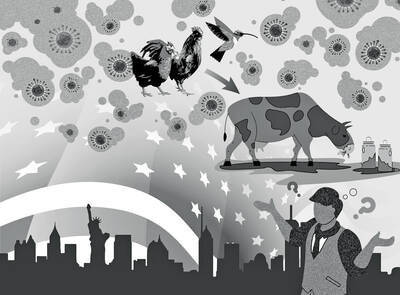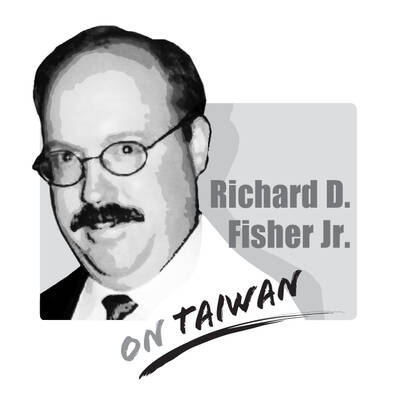Lessons from the elections
Following Saturday’s presidential and legislative elections, even if Taiwan-centric voters anticipated that the Democratic Progressive Party (DPP) might not win more than half the seats in the Legislative Yuan, they might still find it hard to accept this result. Disappointing as it is, this outcome raises some points for reflection.
The first theory about the DPP’s loss of seats is the factor of divided votes. In the 2020 legislative election, I thought the reason DPP candidates failed to be elected in legislative constituencies such as Songshan-Xinyi (松山-信義) in Taipei and New Taipei City’s Constituency 1, which includes Tamsui (淡水) and other districts, was that candidates standing for the New Power Party or the Taiwan People’s Party split the pan-green vote.
However, I changed my mind about this following the 2022 local government elections. Taking last weekend’s election in Taipei’s Nankang-Neihu (南港-內湖) constituency and the views of some of my Facebook friends who live there as an example, some of them half a year ago and some a month or two ago said they would cast all three of their ballots for the DPP even if they had negative opinions about the constituency’s DPP Legislator Kao Chia-yu (高嘉瑜).
On the other hand, some people insisted on not voting for Kao and shifted their support to the Taiwan Statebuilding Party candidate, Wu Hsin-tai (吳欣岱). After the votes were counted, about half of my friends blamed Wu for splitting the vote and said that those who did not vote for Kao were responsible for her loss to her Chinese Nationalist Party (KMT) rival, Lee Yen-hsiu (李彥秀). Although Wu’s and Kao’s votes came from a similar support base, it would be wrong to assume that each vote for Wu equals one fewer vote for Kao.
The second question to ponder is whether the DPP should allow its serving legislators to stand as candidates in the 2026 local government elections. In the past, the DPP has criticized KMT politicians such as former legislators Chiang Wan-an (蔣萬安) and Lin Yi-hua (林奕華), now mayor and deputy mayor of Taipei respectively, former Taipei City Councilor Lo Chih-chiang (羅智強) and New Taipei City Mayor Hou You-yi (侯友宜) for abandoning their jobs to stand for election or take up other government appointments. Considering the high standards that voters expect of the DPP, the party’s legislators would probably suffer an even stronger boomerang effect if they made similar moves. It would be wise to think about this now.
A third point is that the DPP should not underestimate KMT Taichung Mayor Lu Shiow-yen (盧秀燕). Lu’s second term in office ends in 2026, so if she stands as the “non-green” camp’s candidate in the 2028 presidential election, she would not face accusations of being a “runaway mayor.” Neither could anyone say things like “the deep blues will not support her” or that she is “blue in her skin, but green in her bones,” as have been bandied about this past year. As the biggest party in the Taiwan-centric camp, how would the DPP handle such a challenge?
The fourth and final conundrum is what to do about new media. When it comes to TikTok and Internet celebrities, some people around my age like to joke that when your kids turn to TikTok, you have raised them for nothing. Unfortunately, TikTok watchers have the same right to vote as you and me. No matter whether you find TikTok users infuriating or amusing, you cannot change this reality. Hopefully after Vice President William Lai (賴清德) is inaugurated in May, his administration will think hard about how to tackle the challenge of new media.
Chen Ching-hsiang
Taipei
A Taiwan State of the Union
The Chinese Nationalist Party (KMT) has proposed having a State of the Union address by the Taiwanese president. In the US, the State of the Union has proven to be a powerful instrument to outline and propose policy, indicate conditions the nation is facing, economic ailments, the administration’s improvement and evolution and the president’s priorities and domestic and international legislative agenda.
The US address satisfies constitutional requirements, and such an addition to Taiwan’s constitution would enrich the nation and supplement its transnational relations. The statement of essential information and principles looking to the future could bring a new state of confidence and clarity on where Taiwan stands in the world. The president could provide the public with information on the actual state of the nation and endorse any procedures considered “necessary and expedient” to the country’s growth and expansion. This would be a step forward, and it is a bit confusing that Taiwan has not adopted this standard practice, although the president’s New Year address might in some respects stand in.
Major State of the Union addresses in the US include former US president Lyndon Johnson’s declaration of an “unconditional war on poverty” in 1965 and former US president Franklin Delano Roosevelt’s “Four Freedoms” speech in 1941. Many other addresses have underscored important US developments and advances in politics and society. During the address, all members of the US Congress are present, as well as the executive cabinet and the judiciary, bringing all branches of US government together. Foreign dignitaries are invited, as well as notable domestic leaders and innovators. Such an agglomeration hearing and participating in such a dialogue brings a real sense of national unity. US President Joe Biden said in his State of the Union address last year: “We must see each other not as enemies, but as fellow Americans,” embracing this sense of unity.
When Biden continued by saying: “We are… the only nation in the world built on an idea,” we might well see Taiwan in the same light.
All of this could benefit Taiwan’s status and feelings of inclusion, domestically and internationally. Hopefully, we could see a Taiwanese president give such a speech soon.
David Pendery
Taipei
A series of strong earthquakes in Hualien County not only caused severe damage in Taiwan, but also revealed that China’s power has permeated everywhere. A Taiwanese woman posted on the Internet that she found clips of the earthquake — which were recorded by the security camera in her home — on the Chinese social media platform Xiaohongshu. It is spine-chilling that the problem might be because the security camera was manufactured in China. China has widely collected information, infringed upon public privacy and raised information security threats through various social media platforms, as well as telecommunication and security equipment. Several former TikTok employees revealed

The bird flu outbreak at US dairy farms keeps finding alarming new ways to surprise scientists. Last week, the US Department of Agriculture (USDA) confirmed that H5N1 is spreading not just from birds to herds, but among cows. Meanwhile, media reports say that an unknown number of cows are asymptomatic. Although the risk to humans is still low, it is clear that far more work needs to be done to get a handle on the reach of the virus and how it is being transmitted. That would require the USDA and the Centers for Disease Control and Prevention (CDC) to get

For the incoming Administration of President-elect William Lai (賴清德), successfully deterring a Chinese Communist Party (CCP) attack or invasion of democratic Taiwan over his four-year term would be a clear victory. But it could also be a curse, because during those four years the CCP’s People’s Liberation Army (PLA) will grow far stronger. As such, increased vigilance in Washington and Taipei will be needed to ensure that already multiplying CCP threat trends don’t overwhelm Taiwan, the United States, and their democratic allies. One CCP attempt to overwhelm was announced on April 19, 2024, namely that the PLA had erred in combining major missions
On April 11, Japanese Prime Minister Fumio Kishida delivered a speech at a joint meeting of the US Congress in Washington, in which he said that “China’s current external stance and military actions present an unprecedented and the greatest strategic challenge … to the peace and stability of the international community.” Kishida emphasized Japan’s role as “the US’ closest ally.” “The international order that the US worked for generations to build is facing new challenges,” Kishida said. “I understand it is a heavy burden to carry such hopes on your shoulders,” he said. “Japan is already standing shoulder to shoulder